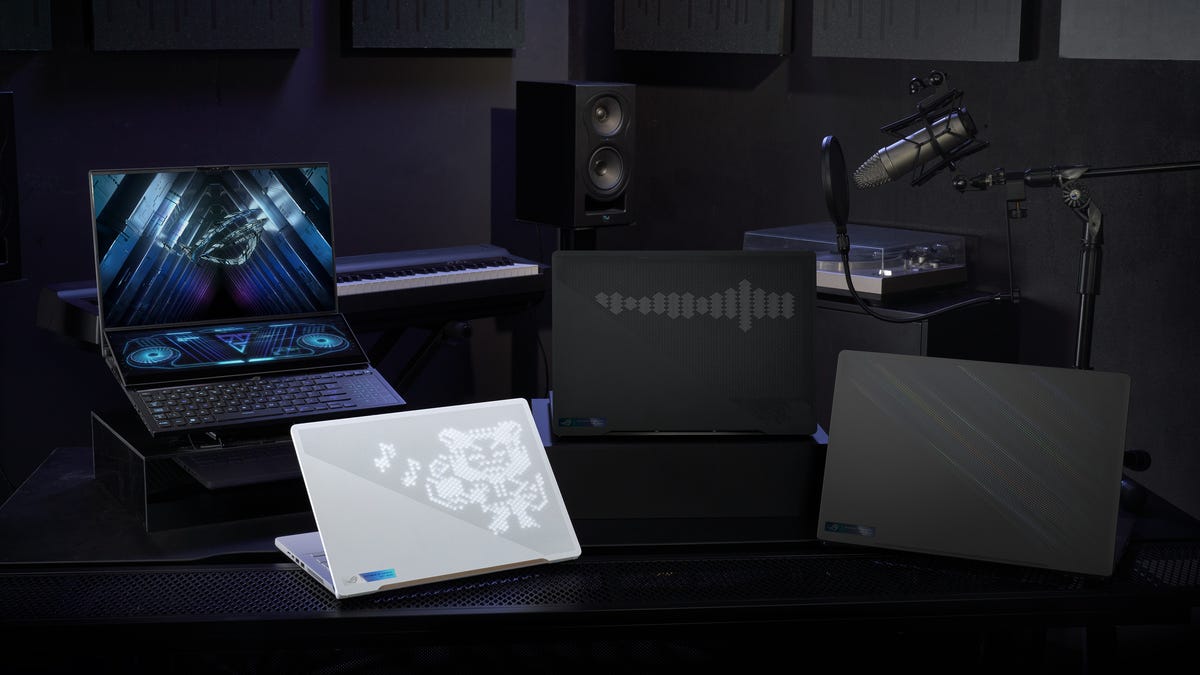Asus Joins the 18-inch Gaming Laptop Club
Besides new CPUs and GPUs, Asus is also jumping on the big-screen gaming bandwagon.

2023 Asus ROG Zephyrus laptops, unveiled at CES.
Asus' CES gaming laptop announcements seem to touch every single model in its portfolio, and include 2023's biggest gaming hardware trend (so far), an 18-inch gaming laptop.
Yes, there are also the usual everything-is-updated-to-2023-generation components, like Intel 13th-gen H and HX-series processors and the Nvidia GeForce RTX 40-series GPUs (as well as "next-gen" AMD CPUs and GPUs, which we're expecting to hear about during the keynote on Wednesday night, Jan. 4). The company has announced a couple of interesting gaming monitors as well.
Screen updates abound -- there are lots of 240Hz 1440p displays with smaller bezels and 16:10 aspect ratios, which you'll see everywhere in gaming laptops -- and you'll see 15- and 17-inch models swapped out for 16- and 18-inch ones, which is another big trend at the show.
The actual physical redesigns are modest, so don't look for an all-ver new look, just new components and features.
Optimized for Optimus
My fave new feature is the rollout of Nvidia Advanced Optimus support across all Asus' gaming laptops with Nvidia GPUs (or at least most of them). That's the technology that enables the laptop screen to switch between operating on the discrete GPU or the integrated GPU without forcing you to reboot, and which finally lets the laptop display use G-Sync. It's potentially a big energy efficiency and battery life saver.
Asus' ROG Nebula HDR displays, available on the Zephyrus M16, Zephyrus G14, Strix Scar 16 and Flow X16, have double the mini LED backlight zones: 1,024. They're DisplayHDR 1000-compliant screens with a peak brightness of 1,100 nits. They have larger heatsinks, too, because that level of brightness can get hot. As mentioned above they're 1440p 240Hz, plus 100% P3 gamut coverage. One exception is the Nebula HDR screen in the Zephyrus G14, which is a dimmer DisplayHDR 600. The 3ms pixel refresh isn't stellar, though.
Asus also has an external GPU box called the XG Mobile. It works with systems like the 13-inch Flow X13 and Flow Z13 laptops and the 16-inch Flow X16, adding extra graphics power. That XG Mobile previously contained an Nvidia RTX 3080 GPU, and this year it'll get bumped up to a newer 40-series RTX GPU. That'll help this expensive add-on feel like a better long-term investment.
The new ROG Strix G16.
AMD isn't getting left out. there's a new model that highlights all the latest and greatest technology on offer from that company, called the TUF Gaming A16 Advantage Edition. It's one of the few laptops incorporating an AMD GPU, which is up to generation RDNA 3 this year. Sadly, the MUX switch -- a clunky way to toggle between the discrete and integrated GPU -- lives on here. It's not as elegant a solution as Optimus, nor does it have Thunderbolt 4 support (it does have USB 4), because that's still an Intel thing.
There are a few other AMD CPU-based models as well and several of the new gaming laptops, including the 16-inch Zephyrus models, have newer six-speaker arrays. Perhaps more importantly, many of the ROG offerings have been (finally) upgraded to 1080p webcams, which is something we should expect from every laptop now.
We don't have any pricing yet, but they all seem to be slated for Q2 shipping.

